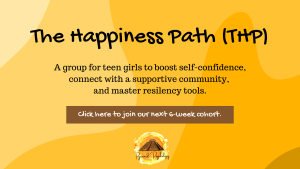Looking Beyond Self Doubt
 Looking Beyond Self-Doubt: Helping Your Teen Find Her Brave
Looking Beyond Self-Doubt: Helping Your Teen Find Her Brave
Watching your teenage daughter struggle with anxiety can be crushing. You want to protect her, to help her skip all the things that make her feel terrible and anxious. The secret is true confidence isn’t built by avoiding fear- it grows when she faces it, little by little. Whether it’s speaking up in class, making a new friend, or trying something new, every small step outside her comfort zone teaches her that she can handle discomfort—and that’s where real resilience begins to start looking beyond self doubt, helping your teen find her brave!
This process, called exposure, helps rewire the brain. The more she leans into challenges instead of avoiding them, the more she tips the scale of confidence in her favour, giving less power to anxiety. It won’t be easy at first, but the reward is worth it: self-trust, confidence, and the belief that she is stronger than her fears. That’s exactly what we do in THP (The Happiness Path)—helping teen girls take those steps in a supportive environment, surrounded by others doing the same.
>>> FREE DOWNLOAD: Depression & Anxiety Toolkit for Parents Raising Teen Girls <<<
If your daughter struggles with self-doubt or fear, THP can help her find her brave, one step at a time. She doesn’t have to do it alone, and neither do you. Resilience isn’t about never feeling anxious—it’s about learning she has the power to move through it. And when she does? That’s when she realizes she’s capable of more than she ever imagined.
Chantal Côté
Registered Psychologist & Teen Life Coach
Founder of Pyramid Psychology and The Happiness Path


 How to Help Your Teen Become Brave
How to Help Your Teen Become Brave









 Chantal Côté (she/her) is a psychologist and teen life coach living in Calgary, Alberta. After over a decade in non-profit and community mental health, Chantal started
Chantal Côté (she/her) is a psychologist and teen life coach living in Calgary, Alberta. After over a decade in non-profit and community mental health, Chantal started 






















